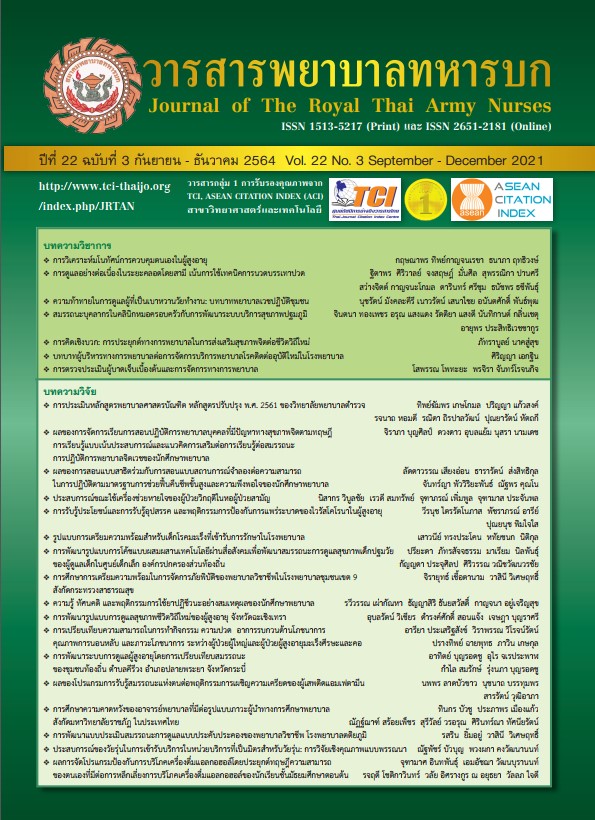The effects of a cognitive behavioral therapy program on the anxiety And depression among patients receiving renal replacement therapy
Keywords:
cognitive behavioral therapy, anxiety, depression, renal replacement therapyAbstract
Anxiety and Depression among patients receiving renal replacement therapy may be caused by health threats or triggers. Helping these patients to reduce their anxiety and depression are important. This quasi-experimental research was conducted to determine the effects of a cognitive and behavioral therapy program on the anxiety and depression among patients receiving hemodialysis or peritoneal dialysis in a hospital. Sixty-six patients with a moderate to severe level of anxiety and mild to severe level of depression were randomly and equally assigned to either the experimental or control group, 33 patients in each group. The experimental group participated in the cognitive behavioral therapy program for eight sessions on four weeks, whereas those in the control group received only usual care. Program evaluation was determined by self-reported questionnaires before and after completion of the program. Data were analyzed using descriptive statistics t-test.
The results showed that after the experiment, the mean scores for anxiety and depression in the experimental group were significantly lower than those before the experiment and those of the control group (p<.05).
Downloads
References
Praha N, Sriyuktasuth A, Kusuma NaAyuthya S, Vongsirimas N. Factors predicting quality of life in women receiving hemodialysis. J Nurs Sci. 2015; 33(4): 27-39. (in Thai)
Joseph K, Carpenter MA, Leigh A, Andrews BA, Sara M, Witcraft BA, Mark B. Powers, Jasper A. J. Smits, Stefan G. Hofmann. Cognitive behavioral therapy for anxiety and related disorders: A meta-analysis of randomized placebo-controlled trials. Anxiety & Depression Association of America. 2018; 35(6): 502-514.
Goh ZS, Griva K. Anxiety and depression in patients with end-stage renal disease: impact and management challenges a narrative review. International journal of nephrology and renovascular disease. 2018; 11: 93–102.
Hudson JL, Moss-Morris R, Game D, Carroll A, Chilcot J. Improving distress in dialysis (iDiD): A tailored CBT self-management treatment for patients undergoing dialysis. J Ren Care. 2016; 42(4): 223-38.
Pliankerd P. Depressive disorder: Nurses role in nursing care. J Royal Thai Army Nurses. 2014; 15(1): 18-21. (in Thai)
Artsanthia J, Noppornpun M, Mungsungnen S, Teeradetchachart P, Amaridchatchawan S. The perception of needs in end stage renal disease patients and caregivers for palliative care: Phenomenological study. J Royal Thai Army Nurses. 2021; 20(1): 244-253. (in Thai)
Clark D, Beck AT. Cognitive therapy of anxiety disorders. New York: Guilford press; 2010. 8. Beck JS. Cognitive behavior therapy: basics and beyound. New York: Guilford press; 2011.
Wongpanarak N, Chaleoykitti S. Depression: A significant mental health problem of elderly. J Royal Thai Army Nurses. 2014; 15(3): 24-31. (in Thai)
Marvi A, Bayazi MH, Rahmani M, Deloei AK. Studying the effect of cognitive behavioral group training on depression in hemodialysis patients. Procedia - Soc Behav Sci. 2011; 30(1): 1831-6.
Cohen SD, Cukor D, Kimmel PL. Mini-review anxiety in patients treated with hemodialysis. Clin J Am Soc Nephrol. 2016; 11: 2250-5.
Train the brain forum (Thailand). Thai mental stait exam (TMSE). Siriraj Hosp Gaz. 1993; 45(6): 359-74. (in Thai)
Spielberger CD. Manual for the state-trait anxiety inventory (STAI) form Y: Self-evaluation questionnaire. Palo Alto, CA: Consulting Psychologists Press; 1983.
Kasantikul D, Karnjanathanalert N, Limsuwan N, Thongtang O, Wutthiganon S, Khuangsirskul W, et al. Health-related self-reported [HRSR]) scale: The diagnostic screening test for depression in Thai population. J Psychiatr Assoc Thail. 1997; 80(10): 647-57. (in Thai)
Downloads
Published
How to Cite
Issue
Section
License
บทความหรือข้อคิดเห็นใดใดที่ปรากฏในวารสารพยาบาลทหารบกเป็นวรรณกรรมของผู้เขียน ซึ่งบรรณาธิการหรือสมาคมพยาบาลทหารบก ไม่จำเป็นต้องเห็นด้วย
บทความที่ได้รับการตีพิมพ์เป็นลิขสิทธิ์ของวารสารพยาบาลทหารบก
The ideas and opinions expressed in the Journal of The Royal Thai Army Nurses are those of the authors and not necessarily those
of the editor or Royal Thai Army Nurses Association.






